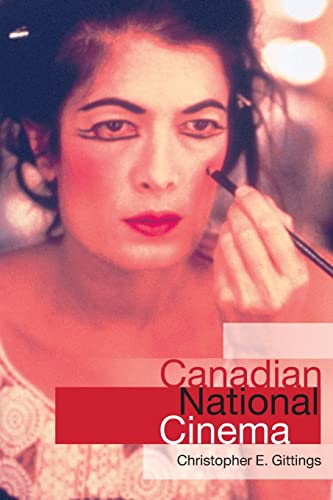Introduction to Canadian Cinema - Books
Search this guide as a starting point for your research into Canadian Cinema.
All Books
-
-
 Canadian National Cinema
by
Call Number: 791.430971/7Publication Date: 2001Canadian National Cinema explores the idea of the nation across Canada's film history, from early treatments of colonization and white settlement such as "The Wheatfields of Canada" and "Back to God's Country, " to recent films like "No, Le Confessional, " and "Map of the" "Human Heart." Through case studies of key films--both well-known and neglected-- Christopher E. Gittings uncovers the tensions in Canadian cinema between white Anglo and Native representations, and between Francophone and Anglo-Canadian narratives. Engaging with questions of inclusion and exclusion, race and representation, gender and sexuality, he shows how access to the production of cinematic images has determined who is represented, and how.
Canadian National Cinema
by
Call Number: 791.430971/7Publication Date: 2001Canadian National Cinema explores the idea of the nation across Canada's film history, from early treatments of colonization and white settlement such as "The Wheatfields of Canada" and "Back to God's Country, " to recent films like "No, Le Confessional, " and "Map of the" "Human Heart." Through case studies of key films--both well-known and neglected-- Christopher E. Gittings uncovers the tensions in Canadian cinema between white Anglo and Native representations, and between Francophone and Anglo-Canadian narratives. Engaging with questions of inclusion and exclusion, race and representation, gender and sexuality, he shows how access to the production of cinematic images has determined who is represented, and how. -
Embattled Shadows : A History of Canadian Cinema, 1895-1939 by
Call Number: 791.430971/4Publication Date: 1978Other Canadian film producers concentrated their efforts on short productions, mostly in government or commercial companies such as Associated Screen News of Montreal. The works of Gordon Spalding, Bill Oliver, and Albert Tessier are discussed in this context. Morris concludes with the founding of the National Film Board which, under the dynamic guidance of John Grierson, was to breathe new life into a moribund industry. In a postscript Morris explores some of the reasons for the unique development of Canadian film making particularly its use of natural settings and documentary when virtually the rest of the world's industry was following the Hollywood pattern of studio location and fictional plots and examines the relationship of the early industry to later developments in Canadian film making. -
Guide to the Cinema(s) of Canada by
Call Number: R791.430971/GUID/1Publication Date: 2001A discussion of the films and personalities of the Canadian cinema. Featuring alphabetically-arranged entries covering films, actors, directors, shorts, and a number of experimental films, it encompasses the diverse output of both the English and French Canadian communities. -
Self portrait : Essays on the Canadian and Quebec Cinemas by
Call Number: 791.430971/2Publication Date: 1980Canadian cinema: the first six decades / Peter Morris -- Hollywood's empire in Canada / Kirwin Cox -- The National Film Board of Canada: 1939-1959 / Piers Handling -- The First wave of Quebec feature films: 1944-1953 / Pierre Véronneau -- 1964: the beginning of the beginning / Peter Harcourt -- Direct cinema / Michel Euvard and Pierre Véronneau -- The Encounter between fiction and the direct cinema / Robert Daudelin -- Animation / Louise Beaudet -- West coast filmmaking / Tony Reif and Kirk Togas -- A Survey of the commercial cinema: 1963-1977 / Pierre Pageau -- Some ideological and thematic aspects of the Quebec cinema / Michel Houle -- A Chronology of Canadian and Quebec cinema 1896-1979 / Pierre Véronneau -
The Cinema of Canada by
Call Number: 791.430971/8Publication Date: 2006The Cinema of Canada contains 24 essays, each on a different key film and divides itself into three distinct categories: English-Canadian cinema; Quebecois cinema; Aboriginal cinema. In so doing, it provides an historical account of the development of film and documentary traditions across the diverse national and regional communities in Canada -
The Shape of Rage : The Films of David Cronenberg by
Call Number: 791.430233/CRON/1Publication Date: 1983Heads explode. Parasites fly at people’s faces. Television sets breathe. A woman grows a spike in her armpit and unleashes a cataclysm on the world. These are the startling images David Cronenberg uses to shock and disturb us as his films travel through a nightmare world where the grotesque and the bizarre make our flesh creep.
Yet beneath the blood and gore, Cronenberg has carved out a reputation as one of the masters of the horror and science-fiction genre. Undaunted by the controversy which has followed him throughout his career, Canada’s own “Baron of Blood” and “Prince of Horror” continues to dazzle audiences with the shocking force and power of his vision.
This book is the first to deal with the work of Cronenberg. Seven critics examine what it is that these horrific films are saying to us. They explore and analyze all of Cronenberg’s explosive creations, from the unique Stereo, through such masterpieces as The Brood, Scanners and Videodrome, to The Dead Zone.
Serving as a counterpoint and insight into the man and his work is a frank, searching and comprehensive interview with Cronenberg himself – a brilliant and relentlessly provocative challenger of our sensibilities and our passions.


